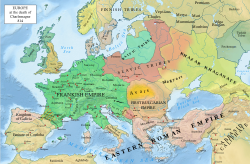Radoslav of Serbia
 From Wikipedia - Reading time: 7 min
From Wikipedia - Reading time: 7 min
| Rodosthlabos Radoslav/Rodoslav | |
|---|---|
| Knez, Archont, Prince of Serbs | |
| Prince of Serbia | |
| Reign | fl. beginning of the 9th century |
| Predecessor | Višeslav |
| Successor | Prosigoj |
| Issue | Prosigoj |
| House | Vlastimirović dynasty |
| Father | Višeslav |
| Religion | Slavic pagan |
Rodosthlabos (Greek: Ῥοδόσθλαβος),[1] usually rendered as Radoslav (Serbian: Радослав,[1][2] or Rodoslav,[3][4][5] was a Serbian Prince (Knez, Archont) who ruled over the early medieval Principality of Serbia at the beginning of the 9th century. He succeeded his father, prince Višeslav, who ruled at the end of the 8th century. Radoslav was succeeded by his son, prince Prosigoj.[6]

According to De Administrando Imperio, compiled by the Byzantine Emperor Constantine VII Porphyrogenitus, during the reign of princes Višeslav, Radoslav and Prosigoj there was no war between the Serbian Principality and its eastern neighbour, the Bulgarian Khanate.[7][6]
Radoslav or his son was the ruler of Serbia during the uprisings (819–822) of Ljudevit Posavski against the Franks.[8] According to the Royal Frankish Annals, in 822, Ljudevit went from his seat in Sisak to the Serbs, somewhere in western Bosnia. Under the same entry, the Royal Frankish Annals state that Serbs were controlling a great part of Dalmatia ("ad Sorabos, quae natio magnam Dalmatiae partem obtinere dicitur") but according to John (Jr.) Fine, it was hard to find Serbs in this area since the Byzantine sources were limited to the southern coast, also it is possible that among other tribes exists tribe or group of small tribes of Serbs.[8][9][10] However, the mentioning of "Dalmatia" in 822 and 833 as an old geographical term by the authors of Frankish Annals was Pars pro toto with a vague perception of what this geographical term actually referred to.[11]
During the reign of prince Radoslav, and his immediate predecessors and successors, the process of gradual Christianization of the Serbs was still going on, starting in the first half of the 7th century and finally ending by the middle of the 9th century.[12]
See also
[edit]References
[edit]- ^ a b Ralph-Johannes Lilie, Claudia Ludwig, Beate Zielke, Thomas Pratsch (2013). "Radoslav - Ῥοδόσθλαβος". Prosopographie der mittelbyzantinischen Zeit Online (in German). De Gruyter. Retrieved 21 November 2024.
{{cite web}}: CS1 maint: multiple names: authors list (link) - ^ Dvornik et al. 1962, p. 134.
- ^ Moravcsik 1967, pp. 154–155:And after some years was begotten of them Boïseslav, and of him Rodoslav...
- ^ Antoljak, Stjepan (1968). "Miscellanea Mediaevalia Jugoslavica - Da li se točno zna kako se je zvao prvi po imenu poznati srpski vladar?" (PDF). Годишен зборник на Филозофскиот факултет / Annuaire de la Faculté de Philosophie (in Serbo-Croatian and English) (20). Филозофски факултет, Скопје: 113–196 (151–152).
- ^ Komatina 2021, p. 230–231:За облик Ῥοδόσθλαβος, Loma, ibidem, 119–120; Исти, Имена, 29, допушта да представља словенско Rodoslavъ, које, међутим, иако познато у чешкој и руској средини, није забележено у српским средњовековним споменицима.
- ^ a b Ферјанчић 1959, p. 50.
- ^ Moravcsik 1967, p. 154.
- ^ a b Ćirković 2004, p. 14.
- ^ Fine 2005, p. 35.
- ^ Curta 2006, p. 136.
- ^ Ančić, Mladen (1998). "Od karolinškoga dužnosnika do hrvatskoga vladara. Hrvati i Karolinško Carstvo u prvoj polovici IX. stoljeća". Zavod za povijesne znanosti HAZU u Zadru. 40: 32.
- ^ Ćirković 2004, p. 15-16.
Sources
[edit]- Primary sources
- Ферјанчић, Божидар (1959). "Константин VII Порфирогенит". Византиски извори за историју народа Југославије. Vol. 2. Београд: Византолошки институт. pp. 1–98.
- Moravcsik, Gyula, ed. (1967) [1949]. Constantine Porphyrogenitus: De Administrando Imperio (2nd revised ed.). Washington D.C.: Dumbarton Oaks Center for Byzantine Studies.
- Pertz, Georg Heinrich, ed. (1845). Einhardi Annales. Hanover.
- Scholz, Bernhard Walter, ed. (1970). Carolingian Chronicles: Royal Frankish Annals and Nithard's Histories. University of Michigan Press.
- Secondary sources
- Ćirković, Sima (2004). The Serbs. Malden: Blackwell Publishing.
- Curta, Florin (2006). Southeastern Europe in the Middle Ages, 500–1250. Cambridge: Cambridge University Press.
- Dvornik, F.; Jenkins, R. J. H.; Lewis, B.; Moravcsik, Gy.; Obolensky, D.; Runciman, S. (1962). P. J. H. Jenkins (ed.). De Administrando Imperio: Volume II. Commentary. University of London: The Athlone Press.
{{cite book}}: CS1 maint: publisher location (link) - Fine, John Van Antwerp Jr. (1991) [1983]. The Early Medieval Balkans: A Critical Survey from the Sixth to the Late Twelfth Century. Ann Arbor, Michigan: University of Michigan Press.
- Fine, John Van Antwerp Jr. (2005). When Ethnicity Did Not Matter in the Balkans: A Study of Identity in Pre-Nationalist Croatia, Dalmatia, and Slavonia in the Medieval and Early-Modern Periods. Ann Arbor, Michigan: University of Michigan Press.
- Komatina, Predrag (2021). Константин Порфирогенит и рана историја Јужних Словена [Constantine Porphyrogenitus and the Early History of the South Slavs] (in Serbian). Belgrade: Vizantološki institut SANU. ISBN 978-86-83883-28-8.
- Живковић, Тибор (2002). Јужни Словени под византијском влашћу 600-1025 (South Slavs under the Byzantine Rule 600-1025). Београд: Историјски институт САНУ, Службени гласник.
- Живковић, Тибор (2006). Портрети српских владара: IX-XII век (Portraits of Serbian Rulers: IX-XII Century). Београд: Завод за уџбенике и наставна средства.
- Živković, Tibor (2008). Forging unity: The South Slavs between East and West 550-1150. Belgrade: The Institute of History, Čigoja štampa.
 KSF
KSF